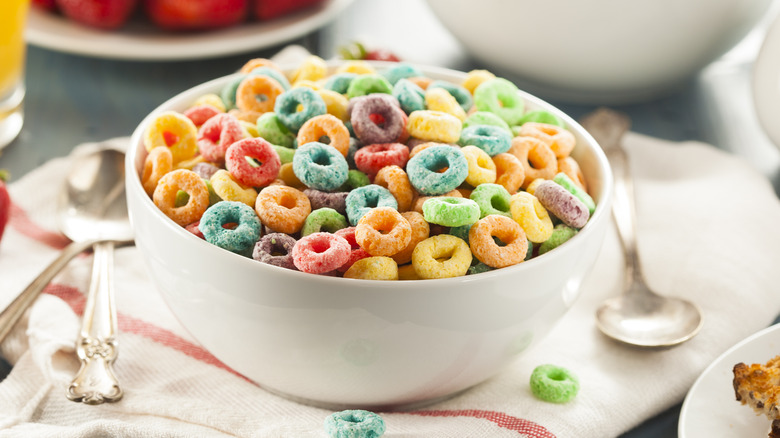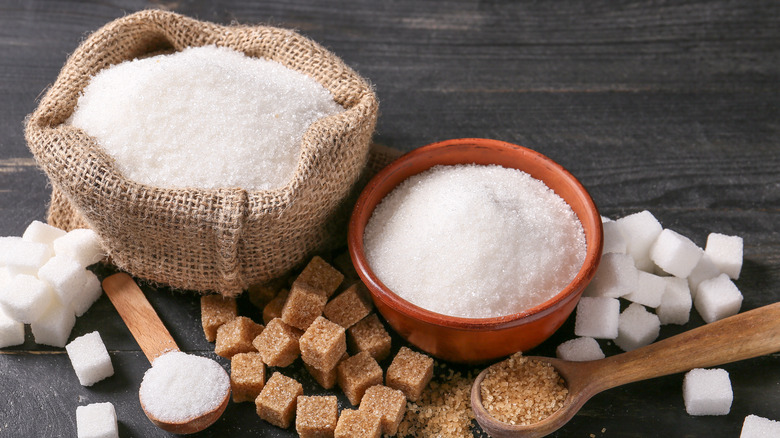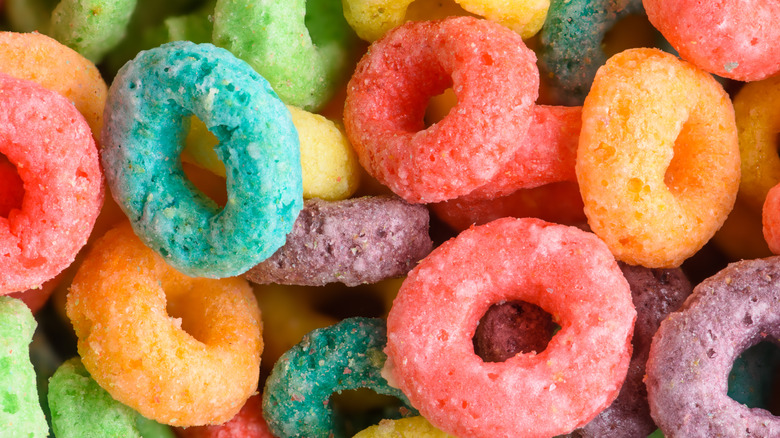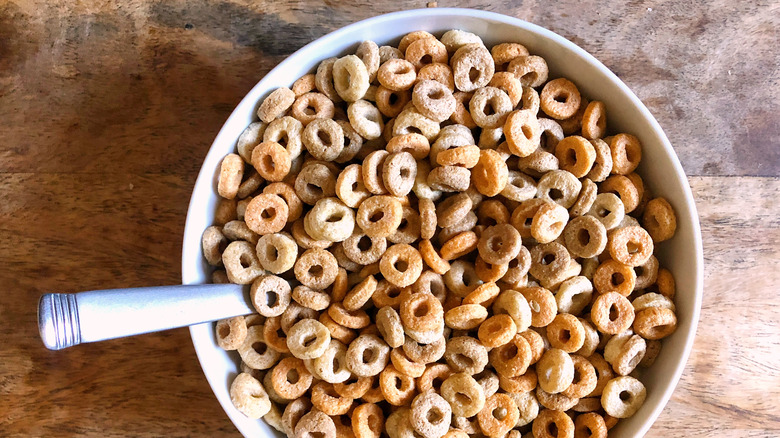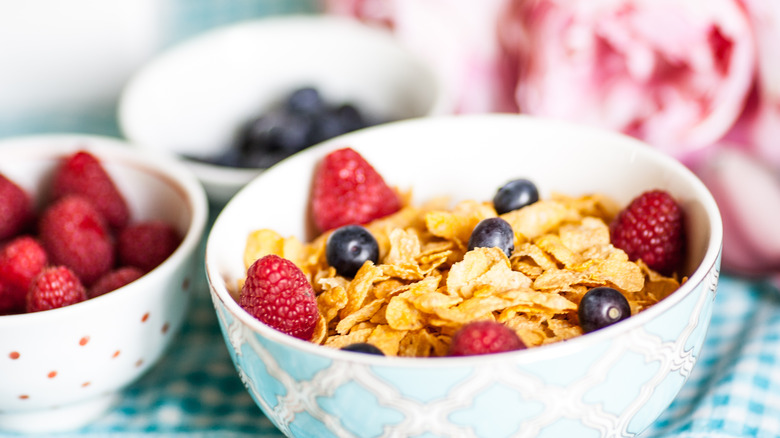This Is What Happens To Your Body If You Eat Cereal Every Day
We've all heard the saying, "Breakfast is the most important meal of the day," and that's very true. Many seem to know this, as, according to Statista, 283.93 million Americans ate cold cereal in 2020. And, of course, popular cereal brands include Honey Nut Cheerios, Frosted Flakes, and Cinnamon Toast Crunch, along with many other breakfast favorites. But just what happens to your body if you eat cereal every day? Turns out that what you're eating for your first meal might not be as healthy as you think.
While there are many healthy cereal options out there, sugary cereals can affect your health in more ways than one. It may seem easy to just pour yourself a bowl of cereal every morning, but it could make a strong impact on your health later in life. Some of the effects are a lack of energy, overeating, cavities, and high blood pressure. We've gathered all the information you need to learn more about the effects cereal has on your body if you eat it every day.
Eating a lot of cereal can quickly increase your daily calorie intake
Before pouring a bowl of your favorite cereal, double-check the nutrition facts on the box and check how much the serving size is. You could be pouring yourself more than one serving. For example, one serving of the Original Honey Nut Cheerios is one and a half cups for consumers four years and older. The bowl you use and how much you pour into it could make a huge impact on how much cereal you're eating every day.
If you think you pour too much cereal in your bowl, you're not the only one. Overestimating how much food to eat is very common. Consumer Reports conducted a study in which they asked several people to pour themselves one of three different kinds of cereals. They found that 92% of study volunteers took more than the average serving size. By eating more than the recommended serving size, it can lead to higher calorie count intake and possible weight gain. So, you may want to start thinking of cereal as one of the breakfast foods to avoid at all costs.
You'll be consuming a lot of sugar if you eat cereal every day
We all have our go-to favorite sugary snack, but did you know that the cereal you consume every morning could have a ton of sugar in it as well? According to the 2015-2020 Dietary Guidelines for Americans, it's recommended to only consume 12 teaspoons (roughly around 200 calories) of sugar for a 2,000 calorie diet. On a daily basis, the average person in America consumes 270 calories of added sugars.
To name a few popular kinds of cereal with high sugar percentages, Kellogg's Froot Loops and Frosted Flakes packs a whopping 12 grams of sugar per serving. Meanwhile, Kellogg's Raisin Bran has 17 grams of sugar per serving.
Notably, in 2014, the Environmental Working Group conducted a study that looked at 1,500 cereals, with 180 of them being considered children's cereals. What EWG found was that if a child ate one serving of those cereals every day for a year, they would eat 10 pounds of sugar. You could be eating the same amount. So, you may want to consider making the switch from eating cereal every day to drinking vegetable smoothies for breakfast instead.
Eating sugary cereals can negatively impact your energy
Having lots of energy is crucial when it comes to getting through your daily routine, but a rise in added sugars and a decrease in other nutrients could cause a decline in your energy later on in the day. There are key nutrients, including fiber (via WebMD), that help you stay energized; however, sugar doesn't do too much. A bowl of sugary cereal might do you some good in the morning, but come to the mid to late afternoon, you might think otherwise, as Health noted.
Sugar does a good job at boosting your blood sugar, but once that rush goes away, it can put a damper on your energy, making it difficult for you to finish your day off strong. "That so-called 'sugar rush' might initially be felt, though a drop in energy is likely to follow shortly after," registered dietitian Sydney Lapp told Eat This, Not That. Only eating sugary foods will just lead you on a path to more sugary meals during the day, so you probably won't want to eat cereal every day.
A serving of sugary cereal probably won't leave you satisfied for long
We all love our sugary treats, but we need to limit ourselves so we don't eat too much. With the heavy amount of sugar packed into a single bowl, cereal lacks the nutrients that are needed to keep you happy and healthy. According to the 2013-2014 National Health and Nutrition Examination Survey, as shared by the National Institute of Diabetes and Digestive and Kidney Diseases, more than one in three adults were overweight and one in three were also classified as obese. Notably, there are many potential health problems the come with being obese, including risks of stroke, high blood pressure, and some cancers, according to the CDC.
In a test study done by the European Journal of Nutrition, which was published in 2012, researchers concluded that participants who ate eggs on a piece of toast were more satisfied than those who consumed a bowl of cereal with milk and toast or a croissant and orange juice. By eating other options at breakfast, it can leave us satisfied longer, helping eliminate the need for unnecessary snacking before lunch.
Not drinking milk after eating dry cereal could be bad for your teeth
Do you like snacking on dry cereal throughout the day? Do you drink a beverage afterwards? Your decision may affect your teeth. It's no surprise that sugar is bad for your teeth. As Healthline explained, "sugar attracts harmful bacteria," potentially causing plaque buildup, which can lead to cavities.
In a 2013 study by pediatric dentistry professor and cariology director Christine Wu, as reported by UIC Today, 20 people were given apple juice, water, or milk with their dry Froot Loops cereal. The study determined which liquid would help reduce plaque's acidity, which could be damaging. "Dry, ready-to-eat, sugar-added cereals combine refined sugar and starch. When those carbohydrates are consumed, bacteria in the dental plaque on tooth surfaces produce acids," Wu said. The end results declared that milk did the best job when drank after eating cereal. However, the same could not be said for consuming milk and cereal together, as the cereal could become "syrupy."
If you eat cereal every day, you could be exposing yourself to a health threat
Have you ever thought of what actually goes into the cereal you eat every day? A test done by the Center for Environmental Health (CEH) found that 82% of oat cereals contained glyphosate. Glyphosate, also known as Roundup, is an herbicide used to kill plants, as explained by the National Pesticide Information Center. The CEH found traces of glyphosate in popular cereal brands, such as Quaker Oats, Nature Valley, Gerber, and Cheerios. The CEH also suggested that food made from corn and soybeans may have hints of glyphosate since both corn and soybeans are usually grown using the herbicide.
Experts are divided on the topic of if glyphosate is a cause of cancer. The International Agency for Research on Cancer (IARC) claims that glyphosate could be a possible threat that causes cancer. "We believe that toxic pesticides, especially ones that may be linked to cancer, really don't belong in the diet," Olga Naidenko, PhD, and the EWG's senior science advisor for children's environmental health, said, as reported by WebMD. On the other hand, the Environmental Protection Agency (EPA) stated that there is no such evidence of glyphosate possibly being linked to cancer.
Eating certain types of cereal can help lower your risk of high blood pressure
Eating cereal is super convenient and quick and it could help lower your risk of high blood pressure if you're eating cereal with the right nutrients. As noted by the Food & Drug Administration (FDA), high blood pressure occurs when the blood in your veins flows through your arteries at an alarming speed. High blood pressure, aka hypertension, poses a lot of threats to your body that you might not even know about, including stroke or even heart disease or failure.
In a 2012 study published in Clinical Nutrition, researchers analyzed over 13,000 men and their cereal-eating habits. They concluded that men in their 50s who eat whole-grain cereal have a lesser chance of having hypertension.
"Cereal is something that people can easily get into their diet and that they enjoy," said Jinesh Kochar, MD, a doctor who specialized in geriatrics and who served a the lead researched on the study, as shared by Health. "And it costs a lot less than the drugs you'd have to take if you had hypertension."
Eating cereal with high protein is a great way to keep your muscles and bones strong
Protein is a crucial part of a daily diet. Not only is protein a great energy source, but it also strengthens your muscles and bones. As explained by Better Health Channel, protein is made up of amino acids, which are "building blocks" that help restore damaged cells and help you grow. Basically, they look out for you.
The amount of protein you're supposed to eat in a day varies. The Dietary Reference Intake is 0.36 grams of protein for every pound of body weight. In an example from Healthline, the standard man who leads a mostly sedentary lifestyle should get about 56 grams of protein and the standard woman with a sedentary lifestyle should get 46 grams daily. Cereals that are high in protein include Kashi GO breakfast cereal (12 grams) and Special K Protein (15 grams).
To make your cereal even healthier, drink a glass of milk with it. "One glass of skim milk contains around 8g of protein as well as other valuable nutrients such as calcium," said dietitian and nutritionist Skye Swaney on her website.
Cereals rich in fiber can help fight type 2 diabetes and heart disease
Next time you're at the grocery store, look for cereals that have more fiber and less sugar — finding a high-fiber cereal is a healthy hack to make a bowl of cereal more filling! Unlike carbs or sugar, fiber cannot be broken down and absorbed in your body, as Mayo Clinic explained. It helps you stay regular in the bathroom, and eating the right amount of fiber each day can help fight type 2 diabetes and heart disease. Fiber also does a good job of lowering cholesterol.
In a test done by Consumer Reports, researchers concluded that cereals like Kellogg's All-Bran Original, Post Grape-Nuts The Original, and Post Shredded Wheat Original Spoon Size are both delicious and filled with all the right nutrients.
"When we eat foods high in fiber [such as whole grains and fruits], combined with a protein source [eggs/egg whites, tofu, cottage cheese, yogurt], we feel fuller longer," registered dietitian Rebecca Solomon told Today's Dietitian. "Toss in some healthful source of fat [eg, almonds, walnuts] and you have a very well balanced breakfast."
